Blood Secrets: Chronicles of a Crime Scene Reconstructionist Read online
Page 7
I tracked Salmon down a few days later. Not only was he missing a front tooth, but he actually admitted to killing Hipsher. He insisted, however, that he had done it in self-defense. Hipsher had attacked him, shouting some cockamamie tale about stolen stuff, and he had had no choice but to protect himself. Yes, he was carrying a knife. Yes, he cut Hipsher’s throat. But it was pure accident. He swung the blade wildly, trying to fend off the crazed derelict, and inadvertently caught Hipsher across the jugular. Terrified by the sight of all that blood pouring out, he and Patty bolted.
I didn’t buy it. Not with twenty-nine slashes. Not with those peculiar blood patterns. I was sure the blood was the key to learning what really went on in that wooded corner of the park that night. My colleagues agreed. But when we dug the crime scene photos out of the files and reviewed them, the bloody triangle in the grass still mystified all of us. Nobody in homicide had seen one like it before.
In the following weeks, as soon as I finished work at the barn I conducted more experiments to re-create the Hipsher murder. I tried angle after angle to determine what would cause the patterns in the crime photos I had tacked up on the wall. No standing position I could think of produced a shape remotely resembling this one. Nor did any seated or prone position. Even if Hipsher had fallen on his side, arms bent toward his head to form a triangle, it didn’t make sense. The blood was too evenly distributed between his right and left arms. Besides, Hipsher was found lying on his back, which meant he had bled into that triangle and then rolled or fallen over when he finally died.
At last, I hit on a possibility: What if Hipsher had been on his knees and elbows, with his forearms on the ground, hands clasped together, while his throat was being cut? Blood would have run into blood on the lower half of his arms as multiple wounds were inflicted, while more blood flowed onto the ground between his forearms, creating a gruesome triangle in the grass and dirt.
There was just one hitch: Hipsher’s stance was hardly an attack pose. If my theory was right—and I was sure it was—Salmon’s tale of self-defense was nonsense. He had forced the transient onto his hands and knees and held him there while he murdered him.
I ran the idea by the other detectives. They agreed, and we presented the evidence to the DA. Despite his efforts to thwart the prosecution by knocking out his other front tooth in his jail cell when he learned that the pear core might be damning evidence against him, Richard W. Salmon went to trial. The prosecutor invited me into the courtroom to reenact the murder and show the jury how a kneeling position would create a triangular pool of blood. They found Salmon guilty in the murder of John Lee Hipsher in 1986. At press time, he was eligible for release in 2010.
At Gunpoint
For most cops, homicide is the pinnacle—the assignment you slog through patrol, vice, robbery, and everything else to reach. Someone asked me recently if it was my favorite assignment as a cop, since my career now revolves around it. In truth, I loved every detail I covered over three decades with the Downey Police Department and the Multnomah County Sheriff’s Office. They were all fascinating—and I learned something from each that I could later apply to murder investigations.
The most harrowing by far was undercover work. If you can handle it, you can handle seeing a bloody corpse. Working undercover steels you against the most dangerous and unpredictable aspects of police work.
The closest I came to getting killed was a buy-and-bust in the back-seat of a car one night on Beaverton’s Watson Street. The area was perfect for a heroin score—dark and deserted apart from myself and the dealer, who had a mop of bushy red hair and a beard to match. I had never met the guy, but I had spoken with him on the phone, and I knew he was hopped up on speed and coke. In person he was even cagier than I had anticipated, fidgeting and tugging at the overalls he wore over a grungy white T-shirt.
I handed him a wadded-up fistful of bills. He gave me a sealed plastic bag of drugs. But then he made an unexpected movement, smooth and swift. The next thing I knew, he was pressing a gun against my forehead.
“You a cop, man?” he demanded.
“Me? No way. I hate cops,” I said, trying to stay calm and in character.
“Yeah?” he said, his eyes squinting suspiciously below deep frown lines. “You’re lying. I know it.”
I played dumb. I rattled off the names of all the users and small-timers from the local drug scene who had vouched for me. I was wearing a wire, and my backup team was listening nearby, but they were too far away to help. The signal to let them know that the deal had gone down was “good shit,” but there was no verbal cue for “I’m about to get my brains blown out,” so I just kept repeating the code, hoping they’d get the message that something was wrong.
“This is good shit, man. Really good shit. It’s the shit. . . .”
The dealer pressed the Saturday night special harder against my head, eyeing me dubiously. A bead of sweat broke loose from my hair-line and ran down my temple.
“This shit is the best! I told you, I ain’t no cop. . . .”
“Maybe I believe you. Maybe I don’t,” he said. “But why take chances?”
And he pulled the trigger.
The gun was loaded, but to my indescribable relief, it misfired.
The dealer stared at it in surprise. “Man, you got lucky,” he said, just as the sounds of screeching tires and slamming doors filled the air. Sharp as ever, my backup team had realized the deal was souring and raced to my aid. They swarmed over him as I stumbled out of the car, knees trembling. Dave Bishop, my friend and fellow narcotics officer who would go on to become chief of the Beaverton Police Department, looked nearly as shaken as I felt while he cuffed the dealer. Dave told me later that he was close enough to hear the click of the trigger and thought I was a goner.
My would-be assassin cursed and spat and called me every name he could think of. “I shoulda killed you when I had the chance,” he growled. “I knew you were a cop!”
Ignoring the spate of threats, I read him his rights and shoved him in the back of a police car as the last of my energy drained away, the adrenaline fueling it finally tapped out. Today, a cop would likely get a month’s time off to recover mentally from an ordeal like that. He would undergo a battery of psychological tests to make sure he could still function. But in those days, you just showed up for work the next morning and tried to convince yourself that nothing had happened. For years that’s exactly what I did—until writing this book brought the memory flooding back in vivid detail and reminded me how very lucky I am to be alive.
The gun that came so close to killing me was admitted into evidence, along with the package of heroin I was “buying” and other incriminating items we found on the red-haired dealer, who turned out to be a Canadian wanted by authorities back home. He was deported with a warning that if he ever showed up in Oregon again, he would be prosecuted for attempted murder.
Code Zero
Another night, I was driving home in my unmarked car after a long shift with Carl Flint,* a partner assigned to me a few months earlier, and an undercover agent named Tina Verdi.* Tina worked for a bail bondsman, and we had recently recruited her to make undercover buys for us. She was a natural and later went on to become a superb policewoman.
We had just dropped off my good friend and undercover colleague Chuck Fessler at his house, and my mind was on the fact that I now had to go home and head straight to the barn. I was ruminating—as I sometimes did in the middle of the night when I was tired enough to keel over and fall asleep in the front seat of my car—about whether the cattle business had been a wise choice of sidelines for a guy whose full-time job already kept him up half the night.
We were passing through an old section of Portland, where the empty streets were lined with modest houses, their windows dark. Then I spied a parked car and the shadowy outline of four men sitting inside it. As we drove past, I spotted a telltale fiery orange flare and the familiar silhouetted profile of someone with a joint pressed to his lips.
“This will only take a second,” I assured Carl and Tina. “I’m not going to bust them. I’ll just check them out.”
Easing my car over in front of theirs, I told the dispatcher I was checking a vehicle at Twentieth and Gladstone. Then I cut the engine and walked back to tap on the car’s window. The driver lowered it and looked up at me, the familiar acrid scent of burning marijuana spilling out of the darkened interior. I flashed my badge and told him he and his buddies would have to knock it off or be arrested.
He stared at me blearily, then shrugged. “Okay, man,” he said. And he closed the window.
I got back in the car and drove away.
Less than a minute had passed when the glare of headlights suddenly turned my rearview mirror blindingly white and the furious rumble of an accelerating engine filled our ears. I squinted into the mirror, shocked to see the car I had just stopped inches away. It rammed my bumper and sent us skidding down the street. As I struggled to control the steering wheel, the car flew past, spun around, and sped straight back at us as if we were contenders in a late night demolition derby. With no time to move out of the way, we sat helplessly watching the ominous glare of headlights barrel toward us. The impact flung us across the seat, and the ear-piercing shriek of metal on metal ripped through the quiet neighborhood.
“What the hell are they doing?” I asked.
Tires squealed as the car reversed and charged again. Balancing my hands on the steering wheel, I took aim and fired my .38 through my windshield. Across the front seat, Carl did the same. But our bullets missed the men in the car. (I later learned that mine hit the front seat, inches under the driver’s arm, and lodged in the back just over the head of one of the passengers, who had wisely crouched down out of the way.)
I had to get Tina out of there. She was an unarmed civilian working for us as a volunteer. If she got hurt, there would be hell to pay.
“One six nine! Shots fired! Code zero,” I shouted into the radio. “Shots fired. Repeat, shots fired.” It was Multnomah County’s equivalent of Downey’s nine ninety-nine—a numeric urgent distress call for “Officer needs help!”
Then I grabbed Tina’s arm. “I’ll be back in a second,” I told Carl as I yanked her out of the car. We sprinted through a line of trees toward the nearest house as the dopers’ car came careening up on the lawn behind us like a gored bull charging after a matador, sending dirt and debris flying.
We leapt across the porch and banged on the door. “Police!” I cried. “Police! Open up!”
A moment later, the door cracked open and an elderly woman peered out through a sliver of light, clutching at her bathrobe.
“What’s going on?” she demanded. “I heard gunshots!”
“I’m a police officer, ma’am,” I explained hurriedly, flashing my badge. “We’ve got some trouble and I need to keep Tina here with you where she’ll be safe. I’ll come back for her.”
“All right,” she said, opening the door wider and squinting curiously past us toward the darkened lawn.
“Keep it locked,” I warned. Behind me, I could hear the whine of tires on grass and the crunch of metal hitting wood. The crazy bastards were tearing up the lawn, trying to get through the trees to reach me.
I ran back toward them, my gun aimed again at their windshield. When they saw me, all four men stepped out of the car, their silhouettes illuminated in the glare of the headlights. Behind them, I could see their smashed fender dangling precariously.
Where the hell was Carl? Had they knocked him out? Run over him? I peered into the darkness behind the damaged car. Maybe he was lying on the street somewhere beyond my line of vision.
“Man, you picked the wrong car to fuck with,” the ringleader said.
I pointed my gun at his head. “Police!” I shouted, holding up my badge. “Nobody move!”
“I don’t see a uniform on you,” he said. “How do I know you’re a cop?”
“Yeah,” another chimed in. “How do we know that’s a real badge? Let me get a closer look at that thing.”
Why couldn’t we have run into these guys before dropping off Chuck? He and I had improvised our way through life-threatening jams during buy-and-busts. I sure could have used his help now.
“You take one step forward and you’re dead,” I warned, keeping my finger on the trigger.
He hesitated and glanced at his friend, who was still sizing me up, his head cocked to one side.
At first they made no move toward me, unsure whether to take my threats seriously. Then the ringleader seemed to make his decision. He took a step forward when out of the darkness came the wail of sirens. As the sound swelled, ear-piercing and echoing over the houses, my shoulders sagged with relief. I felt suddenly as if I were back in the parking lot behind Tahitian Village.
A moment later, police cars roared up and county cops leapt out, guns aimed at the men surrounding me. In the commotion, I caught sight of Carl slinking out from behind a cedar sapling thirty yards away. Rage coursed through me as I realized he had been cowering back there the whole time.
Keeping his eyes averted, he slunk over and fell in stride beside me.
“Where the fuck were you?” I demanded.
He mumbled something about running out of bullets.
I’m generally a forgiving person, but I refused to work with Carl after that. We nearly came to blows several times at the sheriff’s office.
“You were crazy for going out there! What the hell were you thinking?” he shouted at me, bolder now that he was back in the safety of the station.
“What the hell were you thinking?” I yelled back.
Chuck, who learned what happened when he saw the bullet holes in my windshield the next day, stepped in to diffuse the tension more than once.
Partners in any endeavor need a certain level of trust, and when you’re a cop, that need intensifies. You have to know beyond doubt that the person who is supposed to be watching your back is going to rush in—not run away.
Carl left the sheriff’s office a short time later, and I didn’t bother to keep track of his whereabouts. His actions served as a harsh reminder to me that not everybody has the temperament or the stomach for police work, even when there is not a drop of blood involved.
Changing Lives
In my experience, every assignment will help make you a better cop if you’re smart enough to put your heart into it and learn from it. The one that taught me the most about human nature was community policing.
Although I have put my share of criminals behind bars, I have always been a proponent of helping people turn their lives around. I spent more than a decade as a youth group leader for my church, counseling troubled teens who would show up at the door begging for shelter in the middle of the night. Perhaps that’s why in 1989 I was assigned to spearhead a community-policing effort in Portland’s infamous Columbia Villa.
The place spanned only one square mile, but it was a nightmare of squalid, subsidized housing projects, infested with Crips gang members and rife with violence and drugs. Wearing red—the signature color of the rival Bloods gang—was enough to get you killed in Columbia Villa. The rat-tat of gunfire ricocheted off the shabby buildings on a daily basis, from drive-by shootings, bravado “hits” by gang initiates trying to make their bones, and random shots into the air that were as apt to hit a child or senior citizen as they were to hit their intended targets.
Black, white, Hispanic, and other ethnic groups lived shoulder to shoulder in the dilapidated buildings, overcrowded with about seventeen hundred residents. Hardworking single moms and elderly pensioners shared walls and corridors with criminals whose rap sheets went on for pages. Come Friday night, the population would swell to about five thousand as gangbangers poured in like lit matches to tinder, igniting the already dangerous place.
I researched tactics other police forces had used successfully to clean up crime-ridden neighborhoods, flew to several cities to see them firsthand, and then handpicked four deputies to help me. I gave
them bicycles to store on racks on the backs of their patrol cars and orders to knock on ten doors during every shift. Gradually we got to know the people, found out what was going on in the community, and built trust. We formed a steering committee of residents, joined forces with social workers, took the kids on fishing trips, helped the unemployed find jobs, and counseled preteens on how to stay in school and out of the gangs that doubled as a fast pass to prison. Gradually, the residents began to stand up to the bad guys and take back their community, and we found ourselves with more informants than we knew what to do with.
I watched dozens of people pull themselves out of poverty and despair and fight their way to happier lives, but the most inspiring was Michelle Thompson.* A longtime dealer, user, and prostitute, Michelle came from a line of drug addicts. Her dad had died of an overdose when she was a kid, and—judging from the apathy she seemed to show the two dirty, disheveled preschoolers I often saw straggling along at her heels—she was bent on continuing the family tradition.
My instinct would have been to write Michelle off as a lost cause. She was a chronic thorn in our sides—defiant, antagonistic, and back to hustling the moment she got out of jail. But my deputies wouldn’t give up on her. They paid her regular visits, always treating her politely despite her foulmouthed belligerence toward them. At last the façade began to crack, and Michelle timidly confessed a desire to change her life. We enlisted some women from my church to revamp her wardrobe and teach her how to handle a job interview. Then we got her part-time filing work at the sheriff’s office, checking weekly to make sure her arms were free of track marks.
Life was looking up for Michelle as Christmastime drew near. She was off drugs, getting to the office on time, and—she confided in us—hoping to scrape together enough cash to buy a tricycle for her kids.

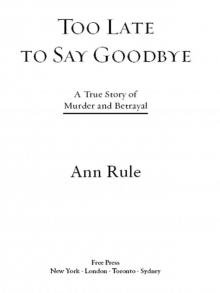 Too Late to Say Goodbye: A True Story of Murder and Betrayal
Too Late to Say Goodbye: A True Story of Murder and Betrayal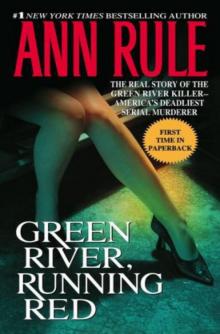 Green River, Running Red
Green River, Running Red Bitter Harvest
Bitter Harvest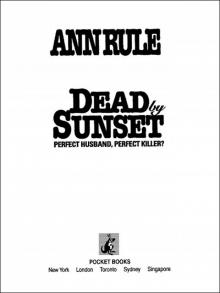 Dead by Sunset: Perfect Husband, Perfect Killer?
Dead by Sunset: Perfect Husband, Perfect Killer?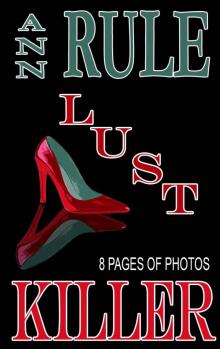 Lust Killer
Lust Killer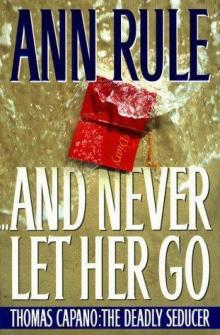 And Never Let Her Go: Thomas Capano: The Deadly Seducer
And Never Let Her Go: Thomas Capano: The Deadly Seducer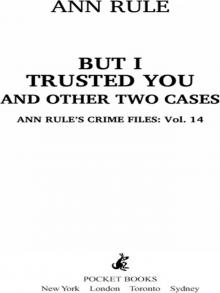 But I Trusted You and Other True Cases
But I Trusted You and Other True Cases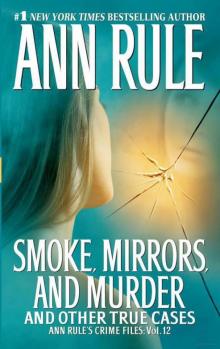 Smoke, Mirrors, and Murder and Other True Cases
Smoke, Mirrors, and Murder and Other True Cases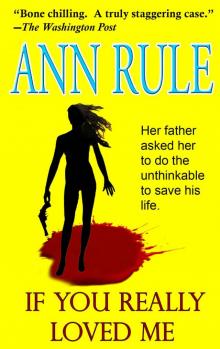 If You Really Loved Me
If You Really Loved Me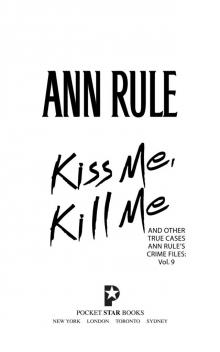 Kiss Me, Kill Me and Other True Cases
Kiss Me, Kill Me and Other True Cases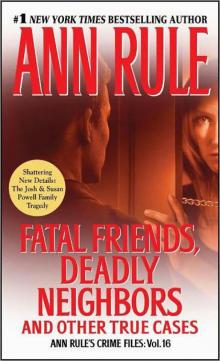 Fatal Friends, Deadly Neighbors and Other True Cases
Fatal Friends, Deadly Neighbors and Other True Cases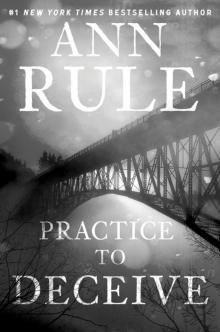 Practice to Deceive
Practice to Deceive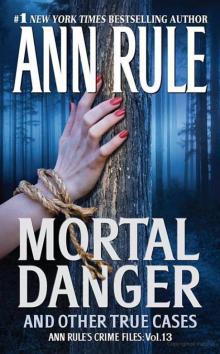 Mortal Danger and Other True Cases
Mortal Danger and Other True Cases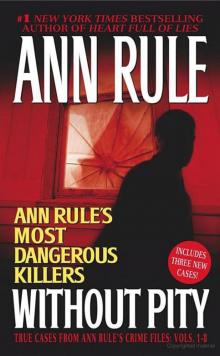 Without Pity: Ann Rule's Most Dangerous Killers
Without Pity: Ann Rule's Most Dangerous Killers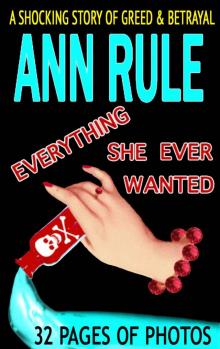 Everything She Ever Wanted
Everything She Ever Wanted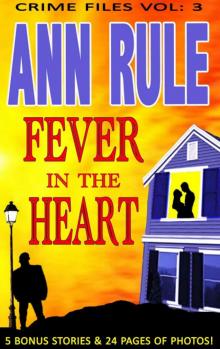 A Fever in the Heart and Other True Cases
A Fever in the Heart and Other True Cases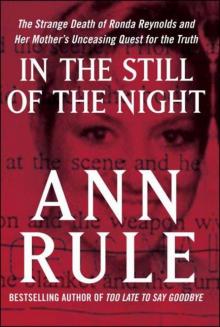 In the Still of the Night
In the Still of the Night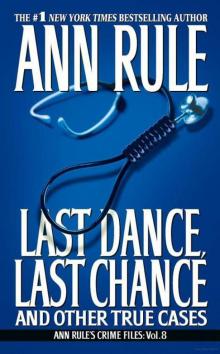 LAST DANCE, LAST CHANCE - and Other True Cases
LAST DANCE, LAST CHANCE - and Other True Cases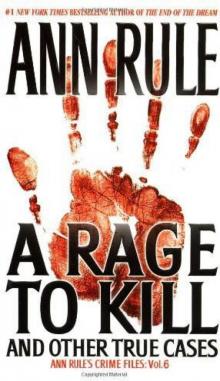 A Rage to Kill
A Rage to Kill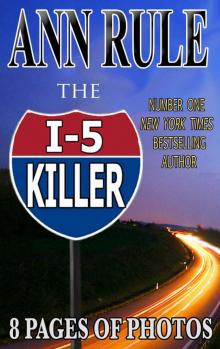 The I-5 Killer
The I-5 Killer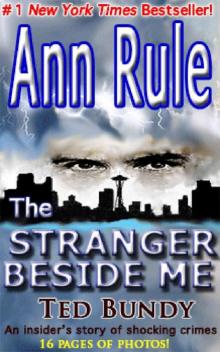 The Stranger Beside Me
The Stranger Beside Me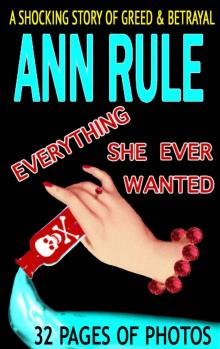 Everything She Ever Wanted: A True Story of Obsessive Love, Murder, and Betrayal
Everything She Ever Wanted: A True Story of Obsessive Love, Murder, and Betrayal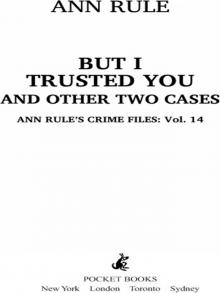 But I Trusted You
But I Trusted You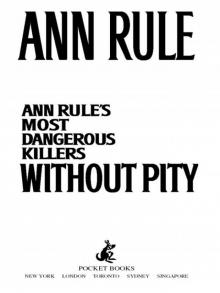 Without Pity
Without Pity Kiss Me, Kill Me
Kiss Me, Kill Me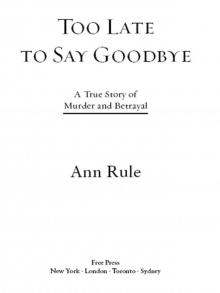 Too Late to Say Goodbye
Too Late to Say Goodbye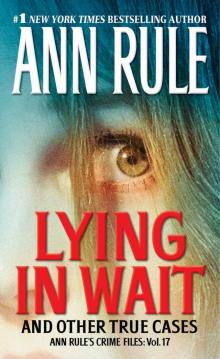 Lying in Wait
Lying in Wait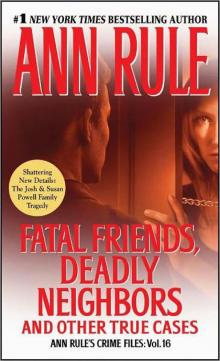 Fatal Friends, Deadly Neighbors
Fatal Friends, Deadly Neighbors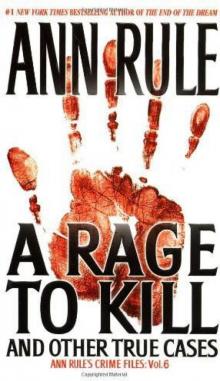 A Rage to Kill: And Other True Cases
A Rage to Kill: And Other True Cases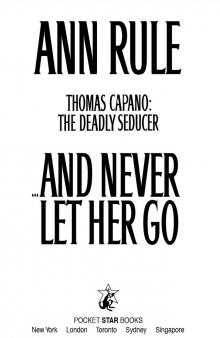 And Never Let Her Go
And Never Let Her Go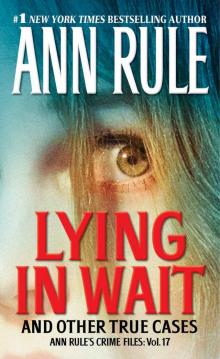 Lying in Wait Ann Rule's Crime Files Vol.17
Lying in Wait Ann Rule's Crime Files Vol.17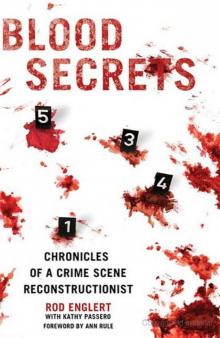 Blood Secrets: Chronicles of a Crime Scene Reconstructionist
Blood Secrets: Chronicles of a Crime Scene Reconstructionist No Regrets
No Regrets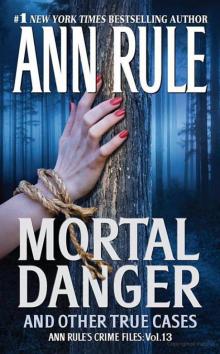 Mortal Danger
Mortal Danger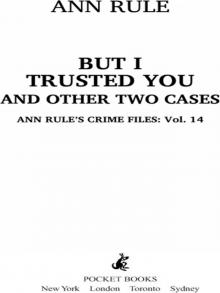 But I Trusted You: Ann Rule's Crime Files #14
But I Trusted You: Ann Rule's Crime Files #14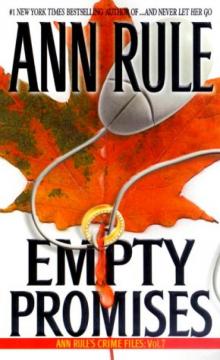 Empty Promises
Empty Promises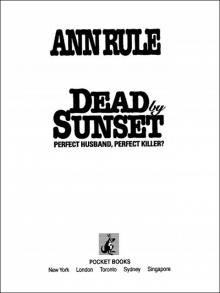 Dead by Sunset
Dead by Sunset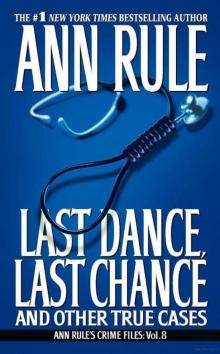 Last Dance, Last Chance
Last Dance, Last Chance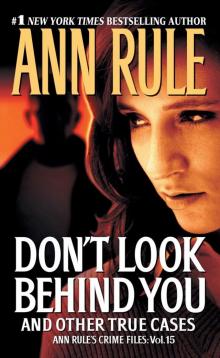 Don't Look Behind You
Don't Look Behind You